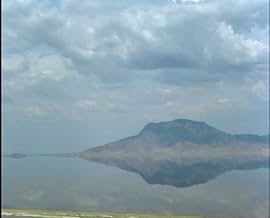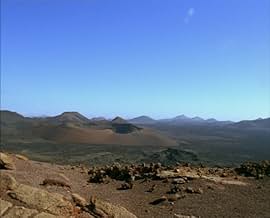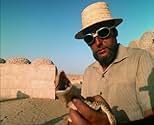IMDb RATING
6.7/10
4.3K
YOUR RATING
Footage shot in and around the Algerian Sahara Desert, accompanied only by a spoken creation myth and the songs of Leonard Cohen.Footage shot in and around the Algerian Sahara Desert, accompanied only by a spoken creation myth and the songs of Leonard Cohen.Footage shot in and around the Algerian Sahara Desert, accompanied only by a spoken creation myth and the songs of Leonard Cohen.
- Director
- Writer
- All cast & crew
- Production, box office & more at IMDbPro
Featured reviews
10D Kieckh
Successful films on metaphysical subjects are rare, but Fata Morgana is a good case. You can chalk up the large subject to the ambitions of youth, but Herzog does an amazingly good job. The movie's point is to show human beings, and even the world, from a non-human point of view.
The movie is in three parts: Creation, Paradise, and The Golden Age. The imagery of each is in counterpoint to the voice-over. Although the text of `The Creation' (from the Popol Vuh, a Mayan myth) refers to the primordial wasteland, the scene goes no further in illustrating the myth. It dwells on the waste, and on various specimens of destruction (fire, smoke, wrecked vehicles). The images from `Paradise' are anything but that, and `The Golden Age' is darkly comic the highest culture is the strange roadside musical act.
The Popol Vuh suggests that mankind is the central object of creation, but the movie does everything it can to undo this notion. Its mythological framework has no referent in human historical time. There are no human characters to speak of. When a boy stands with a dog in an extended shot, the initial suggestion is of the boy's point of view; by the end it is much more the dog's. Likewise the lizard is a stronger character than the human who introduces it, and the turtle's partner barely looks human with his big flippers.
Animal stories and nature documentaries always anthropomorphize, but Fata Morgana has none of that. Certainly the dunes look like a female body, but the simile cuts both ways. Presumably only humans can distinguish easily between their creation and nature, and here airplanes and factories are presented alongside mountains, lakes, and waterfalls. People and civilization are all part of a broader natural landscape.
In 1979 Herzog put a new twist on the idea when he remade Nosferatu from the vampire's point of view.
The movie is in three parts: Creation, Paradise, and The Golden Age. The imagery of each is in counterpoint to the voice-over. Although the text of `The Creation' (from the Popol Vuh, a Mayan myth) refers to the primordial wasteland, the scene goes no further in illustrating the myth. It dwells on the waste, and on various specimens of destruction (fire, smoke, wrecked vehicles). The images from `Paradise' are anything but that, and `The Golden Age' is darkly comic the highest culture is the strange roadside musical act.
The Popol Vuh suggests that mankind is the central object of creation, but the movie does everything it can to undo this notion. Its mythological framework has no referent in human historical time. There are no human characters to speak of. When a boy stands with a dog in an extended shot, the initial suggestion is of the boy's point of view; by the end it is much more the dog's. Likewise the lizard is a stronger character than the human who introduces it, and the turtle's partner barely looks human with his big flippers.
Animal stories and nature documentaries always anthropomorphize, but Fata Morgana has none of that. Certainly the dunes look like a female body, but the simile cuts both ways. Presumably only humans can distinguish easily between their creation and nature, and here airplanes and factories are presented alongside mountains, lakes, and waterfalls. People and civilization are all part of a broader natural landscape.
In 1979 Herzog put a new twist on the idea when he remade Nosferatu from the vampire's point of view.
Fata Morgana is, by far, one of the weirdest and most perplexing art films I have ever seen. I hesitate to call it a documentary because, while is does have elements of documentation of it's images, the images themselves are so unusual, so hallucinogenic, so unclear, that I wonder whether it was really worth telling this story just so that these images can exist. The film basically is the tale of the earth and the creation of the earth shot from the perspective of an outsider, be it alien or something otherwise indescribable, all taking place in the Sahara desert. The title of the picture relates to the illusion or reflection of images, both real and hallucinated, that people in the desert often witness. These are also known as mirages.
The film opens with a plane landing followed by the plane landing again and then again and again and again and again and again and again. With each plane landing shot, the actual architecture of both the location it is landing at and the plane itself begin to slowly dissolve into one another and grow less and less real and more and more reflective imagery. The imagery in this film only grows more intense and more unusual as the picture continues. The narration of the film tells of the creation of the universe as alarming sexual images of sand and landscape move past the camera. The shots go further and further into the desert and Herzog films whatever he sees and finds. The strangest reflections of the world are on display in the distance while Herzog meets some of the most pure and photogenic collections of outsiders that you are ever likely to see. When the Leonard Cohen soundtrack kicks in, you can be sure that you are in the world of a mad man who is in love with the universe.
I cannot say too much more about this film without ruining anything, but I will say that it is a sobering experience and there's really nothing like it. I love seeing films that are just in classes of their own. This film certainly is a good example of how Herzog loves to intermingle narrative storytelling and documentary film-making into an interchangeable form. Fata Morgana unfortunately does overstay it's welcome just a bit, but by the time it nears it's end the images will most likely be burned into your mind forever. Definitely a must-see for those who are obsessed with the nature and the origin of the universe.
The film opens with a plane landing followed by the plane landing again and then again and again and again and again and again and again. With each plane landing shot, the actual architecture of both the location it is landing at and the plane itself begin to slowly dissolve into one another and grow less and less real and more and more reflective imagery. The imagery in this film only grows more intense and more unusual as the picture continues. The narration of the film tells of the creation of the universe as alarming sexual images of sand and landscape move past the camera. The shots go further and further into the desert and Herzog films whatever he sees and finds. The strangest reflections of the world are on display in the distance while Herzog meets some of the most pure and photogenic collections of outsiders that you are ever likely to see. When the Leonard Cohen soundtrack kicks in, you can be sure that you are in the world of a mad man who is in love with the universe.
I cannot say too much more about this film without ruining anything, but I will say that it is a sobering experience and there's really nothing like it. I love seeing films that are just in classes of their own. This film certainly is a good example of how Herzog loves to intermingle narrative storytelling and documentary film-making into an interchangeable form. Fata Morgana unfortunately does overstay it's welcome just a bit, but by the time it nears it's end the images will most likely be burned into your mind forever. Definitely a must-see for those who are obsessed with the nature and the origin of the universe.
10nienhuis
You will be able to tell within the first 30 seconds of this film whether you want to finish watching it. The film opens with images of planes landing at an airport, one plane after another diving into a mirage-filled runway. You will be able to accurately guess that this movie is not about a "story." At first viewing, it's even easy to think the opening images are repetitive shots of the same plane. The initial drama is in the acuteness of your perception, which is built on your willingness to experience the film simply as a series of images. If after this opening, you want to see the movie, you will not be bored. You may even be mesmerized. The movie may be an emotional experience; it may be an intellectual experience; it may be both. Judging from the DVD commentary, which is essential, it was primarily an emotional experience for Herzog, and, at one point, he talks explicitly about how the film is a collaboration between filmmaker and viewer. There's plenty of room for the viewer to make of this film exactly what he or she wants to make of it. Take a gamble?
Famed filmmaker Werner Herzog's "Fata Morgana" is breathtakingly unorthodox. Although characters appear in the film from time to time, there is no actual story. The film is also not an educational or historical documentary. It's a film without an accompanying screenplay.
The film consists of curious background music and a somewhat illogical narrative VO, the combination of which overlays a long string of images from mostly, though not exclusively, the Sahara Desert. Some of the images are wonderfully odd, and out of the ordinary. The camera captures ghostly images, or mirages, optical illusions that tantalize and mesmerize.
This general cinematic trend is punctuated by occasional observational asides on serendipitous topics. For example, in one sequence a man wearing goggles gives us a mini-tutorial on lizards. And in what for me was the most captivating and bizarre sequence, a small inset room contains a man with dark goggles who sings in a voice that is totally distorted by the microphone he's using, accompanied by an old lady who plays a punchy tune on an old piano. Neither the man nor the old lady seems to enjoy what they're doing. How baroque.
"Fata Morgana" does have an underlying concept, one that unites the wide assortment of strange images and eclectic sounds. But that concept is so subtle, so opaque that you'll never figure it out without help. From this subtle theme the film does indeed make sense. Without that point of reference, however, the film can seem tedious and unending, a pointless parade of random earthy images and esoteric narrative gibberish.
Unapologetically redundant, thematically baffling, and cinematically heretical, "Fata Morgana" will likely either make you swoon with delight, or cause you to throw up. You'll either latch on to the film's Zen-like qualities or be tempted to smash the DVD into a thousand pieces. One thing that most viewers will agree on: "Fata Morgana" is ... different.
The film consists of curious background music and a somewhat illogical narrative VO, the combination of which overlays a long string of images from mostly, though not exclusively, the Sahara Desert. Some of the images are wonderfully odd, and out of the ordinary. The camera captures ghostly images, or mirages, optical illusions that tantalize and mesmerize.
This general cinematic trend is punctuated by occasional observational asides on serendipitous topics. For example, in one sequence a man wearing goggles gives us a mini-tutorial on lizards. And in what for me was the most captivating and bizarre sequence, a small inset room contains a man with dark goggles who sings in a voice that is totally distorted by the microphone he's using, accompanied by an old lady who plays a punchy tune on an old piano. Neither the man nor the old lady seems to enjoy what they're doing. How baroque.
"Fata Morgana" does have an underlying concept, one that unites the wide assortment of strange images and eclectic sounds. But that concept is so subtle, so opaque that you'll never figure it out without help. From this subtle theme the film does indeed make sense. Without that point of reference, however, the film can seem tedious and unending, a pointless parade of random earthy images and esoteric narrative gibberish.
Unapologetically redundant, thematically baffling, and cinematically heretical, "Fata Morgana" will likely either make you swoon with delight, or cause you to throw up. You'll either latch on to the film's Zen-like qualities or be tempted to smash the DVD into a thousand pieces. One thing that most viewers will agree on: "Fata Morgana" is ... different.
I saw FATA MORGANA at its US premiere in 1972 and again in 1975. The film remained in my (inexact) memory as possible model or prototype of the "surreal documentary", and I think I had recollections of Herzog's long pans and tracking shots in a back chamber of my mind while filming material in the Dolomites that I later combined with manipulated WWI footage in my own audio-visual work GEBIRGSKRIEGSPROJEKT. Having lived in Austria for 17 years and now being fluent in the language of FATA MORGANA's narration, I was eagerly looking forward to re-encountering the film on DVD.
Unfortunately, I have to admit that I was rather disappointed. The terms of my reaction are largely defined by Werner Herzog's own commentary on the German DVD. That he wanted to make a documentary as if from the point of view of visitors from another galaxy is a good idea and a commendable ambition, but I think the hypothetical visitors from Andromeda would have arrived with a far more anthropologically organized structure of viewing than what Herzog here presents. It would however be unfair to call the film pretentious: it's just not that well thought out. There are indeed some strong images (not only those of the desert mirages ...) that could have been used effectively as expanding material in a more narratively oriented film, or served as basis for a more "experimental" work, such as those of Stan Brakhage (who Herzog professes to admire), but these images are too often weakened by sloppy camera movement or flaccid editing.
I found the use of heterogeneous music (Blind Faith, Leonard Cohen, the Kyrie from one of Mozart's masses) arbitrary and unconvincing. Chance-derived juxtapositions are stimulating now and then, but this is no well-thought-out dialectically surreal counterpoint of image and sound that could really cut into the eye and ear.
Some sequences in the later part of the film (a foreign aid worker having African children recite "der Blitzkrieg ist Wahnsinn", or a scene where German tourists hop up and down in little volcanic craters on Lanzarote) lapse into the ridiculous and unfortunately retrospectively lower the level of what came before.
BUT Werner Herzog is a great filmmaker who has in other works made immense contributions to his art. FATA MORGANA may be one of his weaker films, but I suspect it was essential to his development. I'ts a pleasure and a challenge to view and to think about this film.
Unfortunately, I have to admit that I was rather disappointed. The terms of my reaction are largely defined by Werner Herzog's own commentary on the German DVD. That he wanted to make a documentary as if from the point of view of visitors from another galaxy is a good idea and a commendable ambition, but I think the hypothetical visitors from Andromeda would have arrived with a far more anthropologically organized structure of viewing than what Herzog here presents. It would however be unfair to call the film pretentious: it's just not that well thought out. There are indeed some strong images (not only those of the desert mirages ...) that could have been used effectively as expanding material in a more narratively oriented film, or served as basis for a more "experimental" work, such as those of Stan Brakhage (who Herzog professes to admire), but these images are too often weakened by sloppy camera movement or flaccid editing.
I found the use of heterogeneous music (Blind Faith, Leonard Cohen, the Kyrie from one of Mozart's masses) arbitrary and unconvincing. Chance-derived juxtapositions are stimulating now and then, but this is no well-thought-out dialectically surreal counterpoint of image and sound that could really cut into the eye and ear.
Some sequences in the later part of the film (a foreign aid worker having African children recite "der Blitzkrieg ist Wahnsinn", or a scene where German tourists hop up and down in little volcanic craters on Lanzarote) lapse into the ridiculous and unfortunately retrospectively lower the level of what came before.
BUT Werner Herzog is a great filmmaker who has in other works made immense contributions to his art. FATA MORGANA may be one of his weaker films, but I suspect it was essential to his development. I'ts a pleasure and a challenge to view and to think about this film.
Did you know
- TriviaOne of two films from 1971 to feature a trio of songs by Leonard Cohen, the other being Robert Altman's McCabe and Mrs. Miller.
- ConnectionsFeatured in I Am My Films (1978)
- SoundtracksHey, That's No Way to Say Goodbye
Written and Performed by Leonard Cohen
- How long is Fata Morgana?Powered by Alexa
Details
Contribute to this page
Suggest an edit or add missing content
























